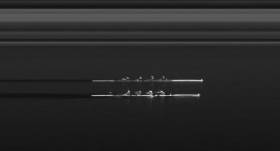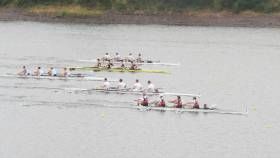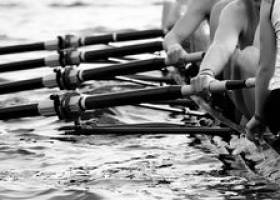Displaying items by tag: Irish Championships
#Rowing: UCD won only their second senior men's eights Championship of Ireland since 1973 at the National Rowing Centre today. They last won in 2011. They had a clearwater lead by half way and never let it go.
The senior women's eight saw NUIG/Castleconnell also win well. The stern pair of Sadhbh O'Connor and Fiona Murtagh were taking their fourth titles of the weekend.
The final session of the Irish Championships started with a UCD win in the men's novice eight and continued with Ruth Morris of Commercial moving well clear to win the women's intermediate sngle sculls.
Colaiste Iognaid won a battle with Commercial in the men's junior pair, while Lee's junior women matched their junior men by winning the quadruple.
The final race of the whole event, the men's intermediate double, was won by Skibbereen.
Cork Clubs on a Run at Irish Championships
#Rowing: Cork clubs had a set of good results in the first session of Sunday finals at the Irish Rowing Championships at the National Rowing Centre.
Cork Boat Club's junior women's pair started the ball rolling, while Skibbereen then took their second title of Championships as Aodhan Burns proved a strong winner of the lightweight single sculls.
Margaret Cremen of UCC had a huge win in the lightweight single sculls, and Lee added the junior men's double to the junior quadruple title they had won on Saturday.
The tighest finish came in the men's club coxed four. NUIG made a tremendous effort to catch St Michael's of Limerick but they fell short by just .329 of a second.
Commercial of Dublin and Fermanagh's Enniskillen Royal Boat Club are having a good reatta. Enniskillen won the men's intermediate pair, while Commercial won the womens intermediate coxed four.
#Rowing: Seven different clubs won in the second session of finals on the second day of the Irish Championships. The races were run in hot sunshine.
Two women's finals senior finals were won in emphatic fashion. Georgia O'Brien of Kenmare won in the women's senior single sculls to give the club its second Championship. NUIG were also well in control in their victory in the women's senior pair.
Sadhbh Scully of Carlow, who is a junior, followed the trend in her big win in the women's club single sculls.
The women's junior 18 eights was a tighter affair, though Bann, once in the lead, held on strongly to rebuff Enniskillen.
The men's junior quadruple was a big event, with Lee taking the title ahead of Three Castles and Neptune.
Cork clubs are having a good Championships, and UCC took the women's club eights.
Skibbereen figured strongly in some finals, but had their first Championship win when Kealan Mannix won the intermediate single sculls from Shane Haugh of Castleconnell.
Davis Of Lee Valley the Irish Junior Champion at Fourteen
#Rowing: Holly Davis gave the crowds a sensational result at the Irish Championships. The Lee Valley girl came through a good battle with Eabha Benson of St Michael's, to pull away and win. The remarkable thing is that Davis is just 14. She does not turn 15 until January 10th next year, leaving her with four years at Junior level.
The men's junior coxed four also electrified the crowd: Colaiste Iognaid and Enniskillen duked it out down the course. The Galway crew got away to win as their emotional supporters roared them on.
Youth was the theme of this regatta: Kevin O'Donovan, who is a junior, won the club single, while Anna Tyther, also under 18 teamed up with Zoe Hyde to win the intermediate double for Killorglin.
The three other titles on offer in this first Saturday session went three different ways: Commercial's strong senior men's programme was on show as they won the men's quadruple; Cork had a fine win in the intermediate men's eight; Trinity's A crew won the women's novice eight.
NUIG and Enniskillen Shine at Irish Rowing Championships
#Rowing: NUIG had a very good first day at the Irish Championships at the National Rowing Centre, taking four titles.
They won the women's senior four, the women's intermediate eight and the women's club coxed four. Sadhbh O'Connor and Fiona Murtagh added the women's senior double sculls for the Galway club.
Enniskillen took two notable titles: their men's junior eight came through under pressure from Colaiste Iognaid, and the women's junior four won from Bann.
Fionnan Crowley retained his title in the men's senior single sculls. The Castleconnell man - a brother of Aileen, who was doing well in the Ireland pair at Rotterdam - won by under a length from Niall Beggan of Commercial, who came at him hard in the closing stages.
UCD's senior four also successfully defended their title.
Tom Kelly won the junior single - the first Championships for the Kenmare club. Kelly, who turns 17 next month, is coached by Noel Casey, who is 85. Casey as based in Britain for decades and coached British women's crews to the Los Angeles Olympic Games.
Carlow's Sadhbh Scully and Ciara Egan won the women's junior double - a first title at this level for the club.
Trinity won the men's club eight in a good race, while Cork Boat Club won the men's intermediate coxed four, and Anna Liffey the women's intermediate pair.
NUIG pushed Queen's hard in the men's novice coxed quadruple, but the Belfast men came through. The women's novice coxed quad from Queen's also won, giving them two victories on a busy day.
Cork Clubs Come to Fore at Irish Rowing Championships
#Rowing: UCC brought their title tally to three as they added the club coxed four to their club eights and intermediate single sculls pots at the Irish Rowing Championships today. The four was tested by four other crews coming to the line but broke free and won. The morning session on the Sunday was held in intermittent light rain.
Margaret Cremen won the women’s lightweight single sculls. The Lee woman looked dominant through much of the race, but as she approached the line she was hunted down by Orla Hayes of Skibbereen, who closed to just a few seconds on the line. Hayes’s clubmate, Aodhan Burns, left no doubts as to his intentions in the men’s lightweight single. He left the rest behind and won well.
The men’s intermediate pair gave Shandon a chance to demonstrate the depth of their talent pool. Stephen O’Sullivan and Colm Hennessy teamed up to win. The Castleconnell junior double of James Desmond and Rory O’Neill came under pressure from Lee in their win.
One of the closest races in the Championships so far came in the women’s intermediate four. Leaders Trinity were pipped on the line by Cork, whose winning margin was under a third of a second (.312).
Killorglin’s Anna Tyther and Rhiannon O’Donoghue gave Fermoy a test in the women’s junior pair. Gill McGirr and Eliza O’Reilly are an excellent crew, however, and held off their Kerry rivals.
Irish Rowing Championships, Day Three (Selected Results)
Men
Four – Club, coxed: UCC A 6:38.03.
Pair – Inter: Shandon A 6:56.07.
Sculling, Double – Junior: Castleconnell (R O’Neill, J Desmond) 6:49.97.
Lightweight Single: Skibbereen (A Burns) 7:20.56.
Women
Four – Inter, coxed: Cork 7:22.36.
Pair – Junior: Fermoy (E O’Reilly, G McGirr) 7:48.69.
Sculling, Lightweight Single: 1 Lee (M Cremen) 8:06.97.
NUIG and Skibbereen Hit the Mark at Irish Championships
#Rowing: Skibbereen won three times and NUIG twice on the first day of the Irish Rowing Championships at the National Rowing Centre. Both the men’s and women’s senior doubles went to the west Cork club, and the also took the women’s intermediate pair. NUIG’s women saw off strong opposition in the women’s four and later took the intermediate eight.
The best men’s senior four was the outstanding combination of David O’Malley, Shane Mulvaney, Shane O’Connell and Andrew Goff, while the junior 18 eight gave Shandon a stirring win over Enniskillen – the first time the Cork club has won this title.
The top single sculler on the day was 27-year-old Fionnan Crowley of Castleconnell, who won a good contest with Kealan Mannix of Skibbereen. Ryan Spelman of St Michael’s won the junior single.
Crowley is a Kerryman, and the best junior women’s double came from Kerry club, Workmen’s.
Irish Rowing Championships, Day One (Selected Results):
Men
Eight – Club: UCC 5:59.49. Junior: Shandon A 5:51.07.
Four – Sen: UCD 6:14.87.
Sculling, Quadruple – Novice, coxed: Univ of Limerick 7:00.33. Double – Sen: Skibbereen 6:52.62. Single – Sen: Castleconnell (F Crowley) 7:13.69. Jun: St Michael’s (R Spelman) 7:35.97.
Women
Eight – Inter: NUIG 6:34.639.
Four – Sen: NUIG 7:11.26. Inter, coxed: Cork 6:52.87. Club, coxed: Shandon A 7:35.52. Junior: Castleconnell 7:06.00.
Pair – Inter: Skibbereen 8:16.16.
Sculling, Quadruple – Novice, coxed: Fermoy 7:49.37. Double – Sen: Skibbereen A 7:07.72. Junior: Workmen’s 7:47.27
NUIG Take Women's Senior Four Title at Irish Championships
#Rowing: NUIG won the much-anticipated women’s senior four final at the Irish Rowing Championships today. Trinity made the early moves, but NUIG moved before halfway, with Commercial and Cork Boat Club also coming into contention. From there the Galway club took it and won from Commercial by over three seconds. Cork were third.
Big Year for Three Rowing Codes
#Rowing: The year 2018 is set to be big one for Rowing Ireland. The National Rowing Centre will host a festival of rowing over three weeks in July. The Irish Championships, with an anticipated entry of over 1,100 crews, is first up. This is followed a week later by the Home International Regatta between Ireland, England, Scotland and Wales. The highlight of the festival will be the Coupe de la Jeunesse, which is a European junior tournament, with crews from 14 countries set to compete. All of this activity is taking place in Olympic or river style boats.
Now there are two other rowing codes under the Rowing Ireland umbrella.
In 2017 Rowing Ireland formed an Offshore Division. Offshore rowing or “FISA Coastal” rowing takes place in single, double and quad scull boats which are wider than Olympic boats and are self-bailing. The crews race a course with multiple turns around a single buoy where navigation is as important as pulling hard. The inaugural Irish Offshore Rowing Championships were held in Arklow in 2017. Over 20 crews competed in the FISA World Championships in France and they returned with a silver medal, taken by Monika Dukarska.
Rowing Ireland also created a Coastal Division in 2017. Coastal rowing has a tradition going back centuries and was often associated with boats rowing out to arriving ships to obtain work. Competition in traditional wooden boats or coastal fours takes place in lanes, with crews rounding individual buoys before returning to the start/finish line. The inaugural Irish Coastal Rowing Championships under the aegis of Rowing Ireland will take place in the National Rowing Centre in August on a separate part of the lake to the Olympic course.
Rowing Ireland brought boats from all three codes together for the first time at the National Rowing Centre on Saturday, February 24th for the picture above.
#Rowing: Skibbereen took two titles and NUIG took three from the second set of finals on the third day of the Irish Rowing Championships at the National Rowing Centre.
Gary O’Donovan and Denise Walsh had very easy wins in the bright sunshine in the finals of the lightweight single sculls. NUIG’s victories – which bring them to eight so far – came in the men’s intermediate pair, where they were tested by Shandon; the women’s intermediate coxed four and the men’s club coxed four.
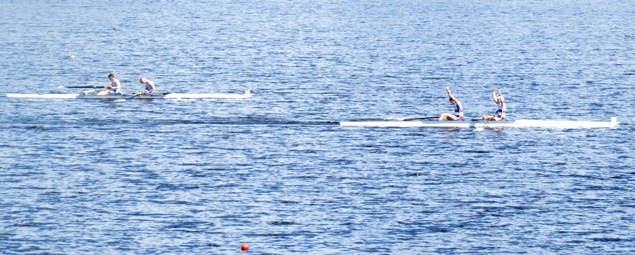 NUIG celebrate after beating Shandon in the intermediate men's pair
NUIG celebrate after beating Shandon in the intermediate men's pair
Eliza O’Reilly and Gill McGirr have been the best junior pair in the country this year and the Fermoy crew proved it with their convincing win. Daire Lynch was similarly emphatic as he took the intermediate single sculls title for Clonmel.
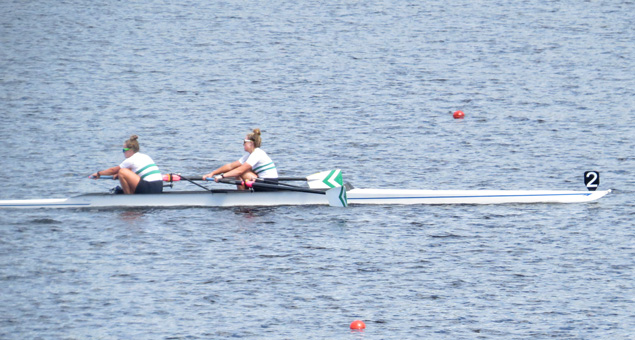 Fermoy on their way to winning the women's junior pair
Fermoy on their way to winning the women's junior pair
Rory Quinn and Oisin Clune of Three Castles added another win to the one they had earlier taken in the junior quadruple when they won the junior double.
Irish Rowing Championships, National Rowing Centre, Day Three (Selected Results)
Men
Eight – Novice: Queen’s 6:21.56.
Four – Club, coxed: NUIG A 6:43.38.
Pair – Inter: NUIG 6:56.09
Sculling, Quadruple – Junior: 1 Three Castles 6:21.53, 2 Shandon 6:22.75, 3 Clonmel 6:23.05.
Double – Junior: Three Castles A 6:50.22.
Single – Lightweight: Skibbereen (G O’Donovan) 7:22.32. Inter: Clonmel (D Lynch) 7:10.25.
Women
Four – Inter, coxed: NUIG 7:23.65.
Pair – Senior: UCD (A Crowley, E Lambe) 7:37.41. Junior: Fermoy 7:53.37.
Sculling, Single – Senior: Old Collegians (S Pupsure) 8:02.64. Lightweight: Skibbereen (D Walsh) 8:09.96. Club One: Carlow (C Nolan) 8:15.22.


























